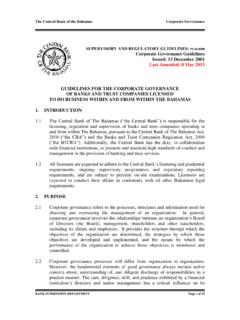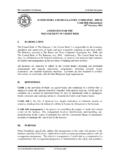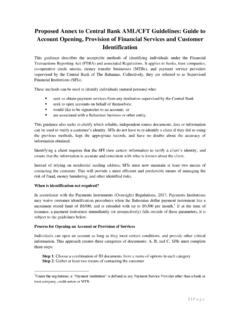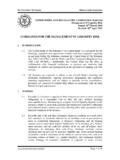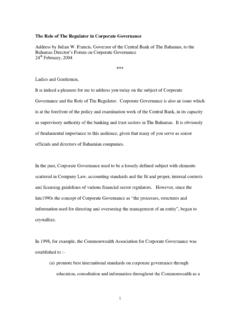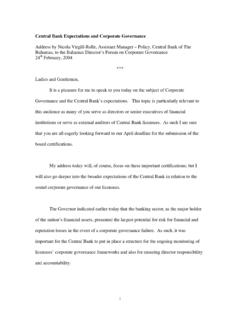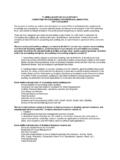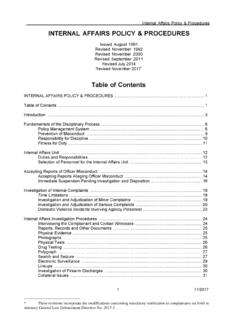Transcription of Business Continuity Guidelines 14 10 08 amendment
1 The Central Bank of The Bahamas Business Continuity Planning SUPERVISORY AND REGULATORY Guidelines : PU19-0406. Business Continuity Issued: 1st May, 2007. Revised: 14th October 2008. Business Continuity Guidelines . I. INTRODUCTION. The Central Bank of The Bahamas ( the Central Bank ) is responsible for the licensing, regulation and supervision of banks and trust companies operating in and from within The Bahamas pursuant to the Central Bank of The Bahamas Act, 2000 ( the CBA ) and the Banks and Trust Companies Regulation Act, 2000 ( the BTCRA ). Additionally, the Central Bank has the duty, in collaboration with financial institutions, to promote and maintain high standards of conduct and management in the provision of banking and trust services. All licensees are expected to adhere to the Central Bank's licensing and prudential requirements and ongoing supervisory programmes, including periodic on-site inspections, and required regulatory reporting.
2 Licensees are also expected to conduct their affairs in conformity with all other Bahamian legal requirements. II. PURPOSE. The events of September 11, 2001 in the United States, terrorist attacks in London, Madrid, Istanbul and elsewhere, outbreaks of Severe Acute Respiratory Syndrome (SARS) and potentially an Avian Flu epidemic have demonstrated the need for robust Business continuity1 arrangements across the globe. This holds true for The Bahamas, which has been subject to hurricanes and island wide electrical outages in recent times. Licensees could face critical operational disruptions due to natural disasters, island-wide electrical outages, faulty inter-bank electronic linkages and other computer problems, acts of terrorism and system failures among others, hence the need to secure Business Continuity by formulating action plans in advance to ensure quick recovery.
3 The quick recovery of Business functions after disruptions is therefore crucial to maintaining public confidence in licensees and the financial system as a whole. Failing which, licensees may impair their ability to provide service to clients ( customers, depositors or investors) and honour obligations to other financial sector intermediaries, 1. Business Continuity is a state of continued, uninterrupted operation of a Business BANK SUPERVISION DEPARTMENT 1 of 10. The Central Bank of The Bahamas Business Continuity Planning which may result in significant financial losses and potentially lead to a contagion effect on the financial system. Business Continuity Management ( BCM ) is a comprehensive approach that includes policies, procedures and standards for ensuring that specified operations can be maintained or recovered in a timely fashion in the event of a disruption and by extension, ensures that the functionality of the financial system as a whole is preserved.
4 An important tangible evidence that an institution has embraced BCM is the formulation of an effective and workable Business Continuity Plan ( BCP ). The resilience2 of a financial system to major operational disruptions3 will be determined by the robustness of the BCPs of all participants within the system. A BCP is a comprehensive written plan of action that sets out the procedures and establishes the processes and systems necessary to continue or restore the operation of an organization in the event of a disaster or major operational disruption. The BCP provides detailed guidance for implementing the recovery plan and outlines the roles and responsibilities in managing operational disruptions. It also defines triggers for activating licensees' BCPs and establishes Business resumption teams for each core Business process. An effective BCP should set out the decision-making authority in the event of an operational disruption and provide clear guidance regarding the succession of authority under those circumstances.
5 The Central Bank endorses the Joint Forum's4 Paper High level principles for Business Continuity issued in August 2006 and has adopted the principles recommended by the Joint Forum in the aforesaid document. These Guidelines outline essential principles that the Central Bank will use as a benchmark in assessing the adequacy of its licensees'. BCPs. The Central Bank expects all licensees to develop and implement workable and effective BCPs to ensure that specified operations can be maintained or recovered in a timely manner in the event of a disruption, consistent with the nature, size, and scope of their operations and complexity of their Business . Additionally, BCPs are by their nature dynamic, evolving and changing as circumstances dictate and hence should be updated regularly. BCPs should also be flexible to address a broad range of potential disruptions.
6 III. APPLICABILITY. The Business Continuity Guidelines ( the Guidelines ) are applicable to all banks and trust companies licensed to do Business in and from within The Bahamas. The Guidelines are not intended to be prescriptive, nor does their broad applicability mean a one-size- 2. Resilience is the ability of an organization, network, activity, process or financial system to absorb the impact of a major operational disruption and continue to maintain critical operations or services. 3. A major operational disruption is a high-impact disruption of normal Business operations affecting a large metropolitan or geographic area and the adjacent communities that are economically integrated with it; and subsequently affects physical infrastructure. 4. The Joint Forum comprises the Basel Committee on Banking Supervision, the International Organization of Securities Commissions (IOSCO) and the International Association of Insurance Supervisors.
7 BANK SUPERVISION DEPARTMENT 2 of 10. The Central Bank of The Bahamas Business Continuity Planning fits-all approach to Business Continuity . A licensee's Business Continuity plan should be flexible, proportionate to its operational risk (arising from both internal and external sources) and tailored to the nature, size, scale and scope of its operations and complexity of its Business . In the case of a licensee that is a branch of a foreign bank, the head office's BCP will suffice, if the plan makes adequate provisions in line with these Guidelines for the licensee. In the case of a licensee that is a subsidiary of a banking group subject to consolidated supervision, the group's BCP will suffice, if the plan makes adequate provisions in line with these Guidelines for the licensee. With respect to managed licensees, the ultimate responsibility for developing a BCP rests with the parent of the licensee.
8 However, the Central Bank will accept an agreement between such licensees and their managing agents on Business Continuity and the plans in place to address the same. Senior management should familiarize themselves with the Guidelines and understand the intent and implications of the principles. Licensees should also read the Guidelines in conjunction with the following documents: Minimum Standards for the Outsourcing of Material Functions Aide Memoire on Handling Confidential Information Outside The Bahamas Licensees are encouraged to conduct a self-assessment of their BCPs against the principles outlined in the Guidelines and rectify deficiencies where applicable. IV. Board and Senior Management Responsibilities The Board of Directors of a licensee ( the Board ) is ultimately responsible for risk management and subsequently the BCP and the effectiveness of the same.
9 The Board is also responsible for endorsing policies, standards and principles developed by senior management for Business Continuity management. Senior management has ultimate responsibility for developing the BCP and ensuring that sufficient resources are devoted to implementing the plan. They must ensure that the necessary administrative support functions in the recovery effort, such as human resources, insurance, legal, security, etc., are in place. They should also ensure that all levels of staff are cognizant of the importance of BCPs and the role it plays in ensuring the continuous functioning of the institution and preserving the functionality of the financial system as a whole. Further, senior management is to ensure that employees responsible for managing the BCP are adequately trained and aware of their responsibilities. BANK SUPERVISION DEPARTMENT 3 of 10.
10 The Central Bank of The Bahamas Business Continuity Planning Senior management should establish clearly which function of the licensee has responsibility for managing the entire process of Business Continuity planning ( the BCP function ). This information should be communicated to the Central Bank and will be the main point of contact between the Central Bank and the licensee with respect to the BCP. The Board and senior management should ensure that an independent party, such as internal or external audit, tests the BCP and that any shortcomings identified are addressed in an appropriate and timely manner. In support of the corporate governance process, senior management should submit a formal written annual statement to the Board indicating whether management is satisfied that the recovery strategies adopted are still valid, and whether the BCP.
